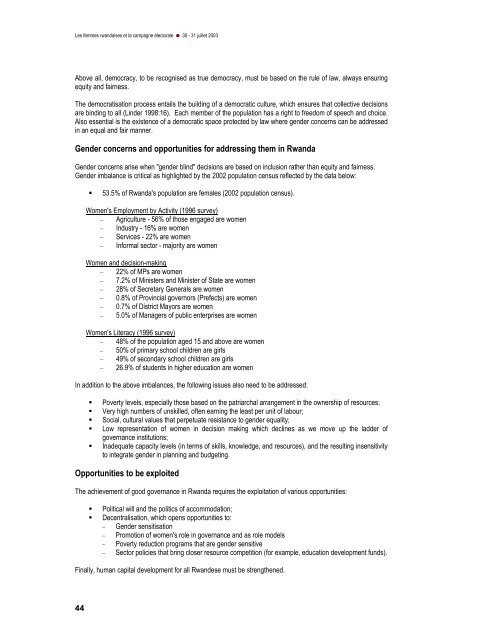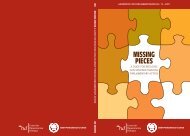Les femmes rwandaises et la campagne électorale - Inter ...
Les femmes rwandaises et la campagne électorale - Inter ...
Les femmes rwandaises et la campagne électorale - Inter ...
You also want an ePaper? Increase the reach of your titles
YUMPU automatically turns print PDFs into web optimized ePapers that Google loves.
<strong>Les</strong> <strong>femmes</strong> <strong>rwandaises</strong> <strong>et</strong> <strong>la</strong> <strong>campagne</strong> électorale • 30 - 31 juill<strong>et</strong> 2003<br />
Above all, democracy, to be recognised as true democracy, must be based on the rule of <strong>la</strong>w, always ensuring<br />
equity and fairness.<br />
The democratisation process entails the building of a democratic culture, which ensures that collective decisions<br />
are binding to all (Linder 1998:16). Each member of the popu<strong>la</strong>tion has a right to freedom of speech and choice.<br />
Also essential is the existence of a democratic space protected by <strong>la</strong>w where gender concerns can be addressed<br />
in an equal and fair manner.<br />
Gender concerns and opportunities for addressing them in Rwanda<br />
Gender concerns arise when "gender blind" decisions are based on inclusion rather than equity and fairness.<br />
Gender imba<strong>la</strong>nce is critical as highlighted by the 2002 popu<strong>la</strong>tion census reflected by the data below:<br />
• 53.5% of Rwanda's popu<strong>la</strong>tion are females (2002 popu<strong>la</strong>tion census).<br />
Women's Employment by Activity (1996 survey)<br />
− Agriculture - 56% of those engaged are women<br />
− Industry - 16% are women<br />
− Services - 22% are women<br />
− Informal sector - majority are women<br />
Women and decision-making<br />
− 22% of MPs are women<br />
− 7.2% of Ministers and Minister of State are women<br />
− 28% of Secr<strong>et</strong>ary Generals are women<br />
− 0.8% of Provincial governors (Prefects) are women<br />
− 0.7% of District Mayors are women<br />
− 5.0% of Managers of public enterprises are women<br />
Women's Literacy (1996 survey)<br />
− 48% of the popu<strong>la</strong>tion aged 15 and above are women<br />
− 50% of primary school children are girls<br />
− 49% of secondary school children are girls<br />
− 26.9% of students in higher education are women<br />
In addition to the above imba<strong>la</strong>nces, the following issues also need to be addressed:<br />
• Poverty levels, especially those based on the patriarchal arrangement in the ownership of resources;<br />
• Very high numbers of unskilled, often earning the least per unit of <strong>la</strong>bour;<br />
• Social, cultural values that perp<strong>et</strong>uate resistance to gender equality;<br />
• Low representation of women in decision making which declines as we move up the <strong>la</strong>dder of<br />
governance institutions;<br />
• Inadequate capacity levels (in terms of skills, knowledge, and resources), and the resulting insensitivity<br />
to integrate gender in p<strong>la</strong>nning and budg<strong>et</strong>ing.<br />
Opportunities to be exploited<br />
The achievement of good governance in Rwanda requires the exploitation of various opportunities:<br />
• Political will and the politics of accommodation;<br />
• Decentralisation, which opens opportunities to:<br />
− Gender sensitisation<br />
− Promotion of women's role in governance and as role models<br />
− Poverty reduction programs that are gender sensitive<br />
− Sector policies that bring closer resource comp<strong>et</strong>ition (for example, education development funds).<br />
Finally, human capital development for all Rwandese must be strengthened.<br />
44

















